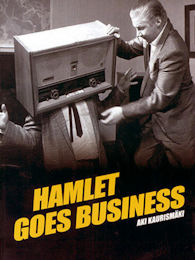
 I can't begin to imagine how many times and in how many versions I've watched "Hamlet" performed. I was probably shown the Mel Gibson version in school. Eventually, I saw Branaugh's Hamlet in the theater and have watched it probably a dozen time since, along with a variety of other versions of the play. Depending on how abridged the play may be, it can range any amount of time upwards of five hours. Last night, I got through a more modern "adaptation" in a mere hour and a half.
I can't begin to imagine how many times and in how many versions I've watched "Hamlet" performed. I was probably shown the Mel Gibson version in school. Eventually, I saw Branaugh's Hamlet in the theater and have watched it probably a dozen time since, along with a variety of other versions of the play. Depending on how abridged the play may be, it can range any amount of time upwards of five hours. Last night, I got through a more modern "adaptation" in a mere hour and a half.
Hamlet Goes Business is a 1987 black & white Finnish adaptation of the play, like a dull noir film filtered through David Lynch, but without any charm. I've seen it referred to as "surreal" or a "black comedy". I don't think either is accurate. You really have to question the Finnish sense of humor if anything in the film was supposed to come across as humorous. The lead was apparently best known for years of sketch comedy work, but he was completely devoid of personality in this particular movie. I'm not sure if something is lost in translation, but there's absolutely nothing interesting about the film.
Most of it is a somewhat faithful adaptation of the play, severely excising details and moving it to the '80s. Hamlet comes from a rich dynasty of sawmill owners and everything in the film revolves around the business. His father's business associate Klaus is the poisoner who marries his mother. Polonius is a company manager whose conniving daughter Ophilia denies sex to Hamlet in hopes of forcing him into marriage. Most of the movie is a tedious, slightly skewed retelling of the play while supposedly young men that look like they're in their forties deal with their parents and elders who appear to be in their fifties. Everyone is ugly. Everything is dull. Nothing is meaningful.
I constantly awaited some major revelation for why the film existed. The changes were vaguely odd but completely unfunny in every way. I assume humor was their intention, but who can be sure? The sawmills and shipyard will be sold to some would-be Fortinbras who will, in exchange, give them a rubber duck manufacturing business. Is that supposed to be comedy? I didn't even realize it was considered a comedy until reading about it later. I could perhaps see some very slim '80s social satire, particularly regarding class structure, but the whole thing is very thin.
In a very weird departure, the ending is totally rewritten. Ultimately, Hamlet kills Polonius' son and Klaus, framing them for killing each other. He walks away, scot-free, to run the business. He calls in his butler/chauffeur to unburden himself about the events of the movie, admitting that he's the one who killed his father, not Klaus. He's going one step farther than Klaus, selling everything to a competitor and walking away with the money. His butler, working for the union to prevent the loss of the shipyard, poisons Hamlet and leaves with the cook to start a new life. So that was certainly... something.
This was really just a waste of time. The director has nothing but contempt for the source material, only reading it a few days before writing the script and starting filming. The only people that seem to like it are moronic, navel-gazing dickheads that think the movie is "funny" or transgressive because it bastardizes Shakespeare . It's a dire indictment of the Finns, at very least. But this is definitely a litmus test as to how much of a snobby, garbage, cinephile shitheel you are.
